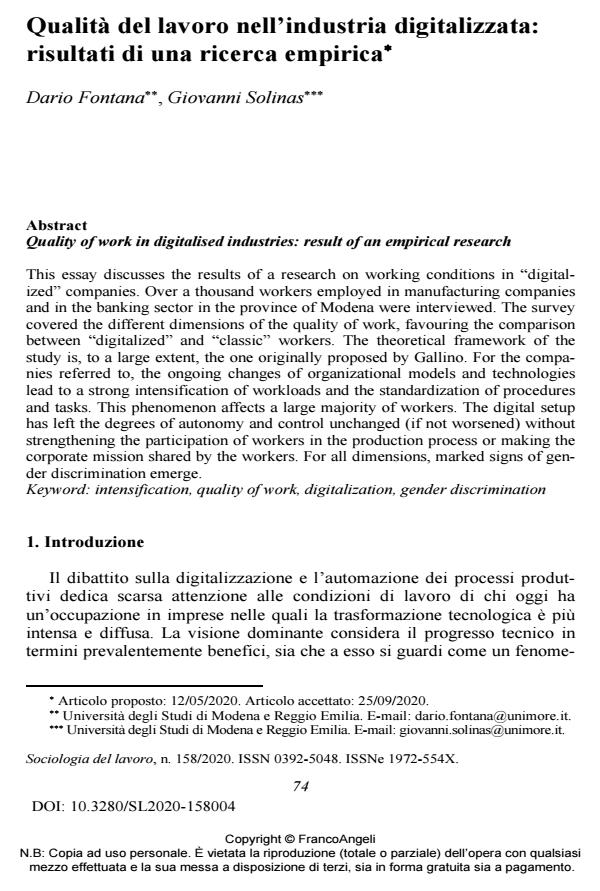Qualità del lavoro nell’industria digitalizzata: risultati di una ricerca empirica
Titolo Rivista SOCIOLOGIA DEL LAVORO
Autori/Curatori Dario Fontana, Giovanni Solinas
Anno di pubblicazione 2020 Fascicolo 2020/158
Lingua Italiano Numero pagine 22 P. 74-95 Dimensione file 275 KB
DOI 10.3280/SL2020-158004
Il DOI è il codice a barre della proprietà intellettuale: per saperne di più
clicca qui
Qui sotto puoi vedere in anteprima la prima pagina di questo articolo.
Se questo articolo ti interessa, lo puoi acquistare (e scaricare in formato pdf) seguendo le facili indicazioni per acquistare il download credit. Acquista Download Credits per scaricare questo Articolo in formato PDF

FrancoAngeli è membro della Publishers International Linking Association, Inc (PILA)associazione indipendente e non profit per facilitare (attraverso i servizi tecnologici implementati da CrossRef.org) l’accesso degli studiosi ai contenuti digitali nelle pubblicazioni professionali e scientifiche
In questo saggio si discutono i risultati di una ricerca sulle condizioni di lavoro in imprese "digitalizzate". Sono stati intervistati oltre mille lavoratori occupati in imprese manifatturiere e nel settore bancario nella provincia di Modena. L’indagine ha riguardato le diverse dimensioni della qualità del lavoro privilegiando il confronto tra i lavoratori "digitalizzati" e "classici". Lo sfondo teorico dello studio è, in larga parte, quello originariamente proposto da Gallino. Per le imprese prese a riferimento, le trasformazioni in atto determinano una forte intensificazione dei carichi di lavoro e una standardizzazione di procedure e compiti. Questo fenomeno coinvolge una larga maggioranza dei lavoratori. L’assetto digitale ha lasciato invariati (se non peggiorati) i gradi di autonomia e di controllo senza rafforzare i meccanismi partecipativi e di condivisione dei destini e della mission aziendale. Per tutte le dimensioni emergono segni marcati di discriminazione di genere.
Parole chiave:Intensificazione, qualità del lavoro, digitalizzazione, discriminazione di genere
Dario Fontana, Giovanni Solinas, Qualità del lavoro nell’industria digitalizzata: risultati di una ricerca empirica in "SOCIOLOGIA DEL LAVORO " 158/2020, pp 74-95, DOI: 10.3280/SL2020-158004